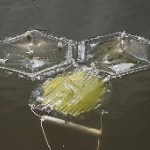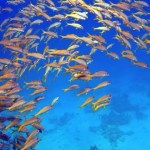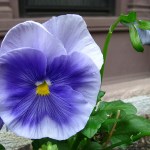environment
... from a secret location. Because, in light of fluctuations in the slug and snail population when I go away, I think they may read my blog.
Tuesday (day 39 of the snail eradication project) and Wednesday (day 40 of the snail eradication project) I found ten slugs each. No snails to speak of.
Both mornings were dry and overcast. All the slugs were located underneath the bags of compost and potting soil by the side of the house.
I didn't go snailing today on account of being in the aforementioned secret location. Where it is both hot and humid. I haven't seen any gastropods here, but…
This method, if it pans out, could not only be clean, it could make the
environment even cleaner.
Jonathan Trent, the lead research scientist on the Spaceship Earth
project at NASA Ames Research Center, has been working on a method to
produce oil from algae. Their Algal Biofuels Team appears to be
making progress.
style="display: inline;">
href="http://www.nasa.gov/centers/ames/news/features/2009/clean_energy_042209.html">NASA
Envisions "Clean Energy" From Algae Grown in Waste Water
NASA scientists have proposed an ingenious and remarkably
resourceful process to produce "…
The observation of World Oceans Day June 8 sparked a lively online debate about the environmental repercussions of seafood consumption. Is it possible to know whether the fish you are eating is truly sustainable? Why is Pacific cod "safe" but Atlantic cod off limits? Is farm-raised salmon really better than wild? Jennifer Jacquet of Guilty Planet, who works with the Sea Around Us Project at the University of British Columbia Fisheries Center, argues that the best solution is to refrain from eating seafood altogether. "I believe people are realizing that the 'choose this but not that'…
The two major policy approaches to cutting carbon emissions, cap-and-trade and carbon taxes, both work by putting a price on pollution. Carbon tax—simply, a tax on fossil fuels—is intended to motivate businesses to conserve energy and switch to cleaner energy sources in order to save money. Cap-and-trade schemes put a limit on how much pollution a company is allowed. Companies that exceed their limit must then buy "carbon credits" from greener companies to compensate. Though these efforts have met with some success, our bloggers ask: is pricing carbon enough to stimulate investment in clean…
When the snail hunter is away, the gastropods will play.
It should be noted, though, that the slugs and snails I found today were not playing in my vegetable garden. That's progress.
Conditions this morning were dry and overcast. However, it rained a little over the weekend, and our wee lawn was watered once with the sprinklers. Most of what I found today was on the lawn or in easy gliding distance from it.
Another observation: I found some slugs clustered around wee, shriveled fallen lemons on the lawn. These slugs were much less responsive to touch than were the gastropods who hadn't…
tags: Birdbooker Report, bird books, animal books, natural history books, ecology books
"How does one distinguish a truly civilized nation from an aggregation of
barbarians? That is easy. A civilized country produces much good bird
literature."
--Edgar Kincaid
The Birdbooker Report is a special weekly report of a wide variety of science, nature and behavior books that currently are, or soon will be available for purchase. This report is written by one of my Seattle birding pals and book collector, Ian "Birdbooker" Paulsen, and is edited by me and published here for your information and…
A highlight of reunion at my alma mater, as far as I'm concerned, it that they open up the boat house and let alumnae paddle (or sail, or crew, depending on their druthers) around the lake.
I've missed the lake.
I was also missing the rest of the Free-Ride family, so I took advantage of the excellent cell phone reception from the middle of the lake and called home.
Among other things, I learned that the younger Free-Ride offspring went snailing in the yard this morning. The yard was reportedly wet in the aftermath of a light rain. The younger Free-Ride offspring took 18 slugs and five…
tags: agribusiness, agriculture, dairy farm, cows, industrial dairy farm, milk, dairy products, streaming video
This is an interesting video of a modern mega-dairy farm, with "all" aspects visible to the public (well, I'll bet not all aspects are visible, since they don't show how sperm is collected, packaged and stored, nor do they show the process of artificial insemination). Visitors get a close up and personal view of the entire process, from the milking barns where they observe cows being milked and fed, and they even can witness live births. This mega-farm also recycles manure into…
Dry and overcast again this morning. I've never been a big fan of humidity, but I was really hoping for some today.
Close inspection of the garden beds indicated that they were gastropod free. The bag of compost and the bag of potting soil on the ground by the side of the house each had only a couple small slugs underneath them. The only other action was on the side of the house, where a snail had attached itself.
Wherever these gastropods are hiding, they seem ready to sit tight ... until they see an opportunity.
Like, if the snail hunter is going to be missing three consecutive mornings…
tags: TEDTalks, ornithology, dodo bird, Adam Savage, streaming video
A unique ecosystem of plants, birds and monkeys thrives in the treetops of the rainforest. Nalini Nadkarni explores these canopy worlds -- and shares her findings with the world below, through dance, art and bold partnerships [18:15]
TEDTalks is a daily video podcast of the best talks and performances from the TED Conference, where the world's leading thinkers and doers give the talk of their lives in 18 minutes. Featured speakers have included Al Gore on climate change, Philippe Starck on design, Jill Bolte Taylor on…
This weekend, with spring in the air, ScienceBloggers left their computers and stepped into the wild outdoors. However, as evidenced by the blog entries they scurried to post shortly thereafter, these are not individuals who take a lazy day off from science. From photographing an unidentified turtle to an alluringly blue pansy, these scientists are constantly observing the world around them with an admirable dose of curiosity.
Turtle in front of my house on A Blog Around the Clock
Photo of the Day #602: Horseshoe crab on Laelaps
More Manhattan Blues on Living the Scientific Life
Is there…
In January, Barack Obama promised in his inaugural address to "restore science to its rightful place." The pledge was a win for scientists everywhere, and particularly for those working in the US. But now, with the European Parliamentary (EP) elections at hand, whether Obama's sentiments are shared by politicians worldwide remains to be seen. Last Thursday through Sunday, members of the 27 member states of the European Union voted for representatives from seven parties to fill 736 seats in the EP. ScienceBlogger Frank Swain of SciencePunk, together with The Lay Scientist, sent a nine-…
Well, it was another dry morning in the back yard. And I was sufficiently busy with other stuff yesterday afternoon that I did not have a chance to set up any beery gastropod watering holes.
So the pickings today were predictably slim.
Not only were most of the plants and planting areas free of visible gastropods, but most of the places where I can count on finding at least one slug on any given morning were slugless.
The big bag of potting soil on the ground near the house had a few slugs under it. There are always at least a few slugs under that bag, even when there are none under the…
The pattern of dry, overcast mornings continues.
Not very satisfying weather for a gastropod hunter.
The only gastropod action this morning was under bags of compost and potting soil, plus one slug hiding on the side of a raised garden bed.
There weren't even that many weeds to pull while I was looking for snails and slugs to pick.
So ... I'm revisiting the beer idea as a way to lure slugs and snails out of hiding (because they have to be hiding somewhere if they appear in relatively large numbers on dewy mornings) and make my morning gastropod forays more productive.
As I've mentioned…
Yet another dry, overcast morning. Not the kind of weather when one feels like sliding on one's foot across scratchy leaves or stems.
At least if one is a snail or slug.
I went right to the instant-gratification spots for slug capture. Only two out of the six locations yielded slugs today. One of them also had a wee snail.
Then, as yesterday, I peeked at the sides of the raised garden beds that are up against the fence with the neighboring yard. Today there was just one snail clinging tenaciously to a bed. I dislodged it with my garden stake, rolled it to within my reach, and tossed it…
In 2008, we
href="http://news.bbc.co.uk/2/hi/uk_news/magazine/7574684.stm">were
informed that a kind of cloud formation had been named: the mammatus
formation, so-called because it resembles a breast. Sort
of. Whatever.
href="http://news.bbc.co.uk/2/hi/uk_news/magazine/7574684.stm">
A new development is more serious. The
href="http://cloudappreciationsociety.org/">Cloud Appreciation Society
has suggested that the name asperatus be given to clouds that
portray a particular kind of turbulence.
Flickr photo by Vince Perritano, Creative Commons license…
tags: Birdbooker Report, bird books, animal books, natural history books, ecology books
"How does one distinguish a truly civilized nation from an aggregation of
barbarians? That is easy. A civilized country produces much good bird
literature."
--Edgar Kincaid
The Birdbooker Report is a special weekly report of a wide variety of science, nature and behavior books that currently are, or soon will be available for purchase. This report is written by one of my Seattle birding pals and book collector, Ian "Birdbooker" Paulsen, and is edited by me and published here for your information and…
Despite the threatening skies yesterday morning, it did not rain. And, it was pretty dry this morning.
Accordingly, the gastropods seemed to have better things to do than sliding along the dry surfaces of my plants, meal or no meal.
Luckily, I've identified a few instant-gratification spots for the slug portion of my patrol. These include the sides of a bucket under the lemon tree, the watering can near the raised beds, the underside of the composter lid, and a bag of mulch, a bag of compost, and a bag of potting soil (the portions of the bags in contact with the ground). Four out of six…
This morning it was dewy and clear as I went on patrol for gastropods. By the time I was done patrolling, clouds had rolled in and there was no sun at all.
Tut, tut. It looks like rain.
Needless to say, the dew had awakened the slumbering slugs, sending them out for a constitutional before the (presumptive) heat of the day. but seeing as how I was out on my constitutional with a fresh Soapy Bucket of Merciful Deliverance, these slugs need never fear hot and dry conditions again.
The slugs today were a full range of sizes, from teeny tiny to pinky-finger sized. Like yesterday the snails…
The morning was dry, but the skies were not overcast, and I think the air temperature was a bit warmer than yesterday morning.
That, plus the two rainfalls earlier this week, seems to have changed things up.
Because today, there were babies.
Most of them were very well hidden -- almost undetectable unless your eye has been trained by twenty-odd days of patrolling for gastropods. But there they were near the base of the rosemary, on the tiny stems of the lemon thyme, on the slender leaves on the society garlic, looking almost like grains of sand or tiny blobs of animal poo: tiny snails and…




